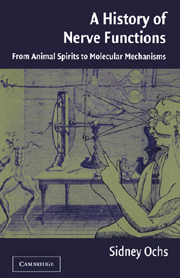Book contents
- Frontmatter
- Contents
- Preface
- 1 Introduction: Greek Science and the Recognition of Nerve as a Channel
- 2 Galen's Physiology of the Nervous System
- 3 Nerve, Brain, and Soul in the Middle Ages
- 4 Renaissance and the New Physiology
- 5 New Physical and Chemical Models of Nerve in the Enlightenment
- 6 New Systematizations of Nerve Function in the Enlightenment
- 7 Electricity as the Agent of Nerve Action
- 8 Nerve Fiber Form and Transformation
- 9 Wallerian Degeneration: Early and Late Phases
- 10 Nerve Regeneration
- 11 Characterization of Axoplasmic Transport
- 12 Molecular Models of Transport
- 13 Actions of Neurotoxins and Neuropathic Changes Related to Transport
- 14 Purposeful Reflexes and Instinctive Behavior
- 15 Neural Events Related to Learning and Memory
- 16 Epilogue: With Observations on the Relation of the Nervous System to Mind
- Bibliography
- Index
3 - Nerve, Brain, and Soul in the Middle Ages
Published online by Cambridge University Press: 13 August 2009
- Frontmatter
- Contents
- Preface
- 1 Introduction: Greek Science and the Recognition of Nerve as a Channel
- 2 Galen's Physiology of the Nervous System
- 3 Nerve, Brain, and Soul in the Middle Ages
- 4 Renaissance and the New Physiology
- 5 New Physical and Chemical Models of Nerve in the Enlightenment
- 6 New Systematizations of Nerve Function in the Enlightenment
- 7 Electricity as the Agent of Nerve Action
- 8 Nerve Fiber Form and Transformation
- 9 Wallerian Degeneration: Early and Late Phases
- 10 Nerve Regeneration
- 11 Characterization of Axoplasmic Transport
- 12 Molecular Models of Transport
- 13 Actions of Neurotoxins and Neuropathic Changes Related to Transport
- 14 Purposeful Reflexes and Instinctive Behavior
- 15 Neural Events Related to Learning and Memory
- 16 Epilogue: With Observations on the Relation of the Nervous System to Mind
- Bibliography
- Index
Summary
After the death of Galen, little progress was made in studies of anatomy and experimental physiology. No successor approaching his level appeared until the Renaissance. The works he left remained the chief guide for the whole of the Middle Ages, with his teachings petrified into the dogmatism known as Galenism. Although he was lauded as representing the highest authority in medicine, on a par with Hippocrates, he was also derided for being opinionated and argumentative. He was even charged with being responsible for holding back progress in the Middle Ages. Modern historians in the twentieth century have given a more evenhanded account of his contributions. Some of his writings have only now been revealed. An important work on the brain, the later book of his anatomical work – On Anatomical Procedures – was translated and published as recently as 1962. Galen's concept of the vascular system lasted into the seventeenth century until it was overturned by Harvey's establishment of the circulation (Chapter 4). The question remains as to why anatomical and physiological investigations remained dormant for so long. The answer must lie in the political and social upheavals after the breakdown of the Roman Empire, during which – alongside the regrouping of the secular power of the nobility – the Church emerged as the dominant intellectual presence in the Middle Ages.
- Type
- Chapter
- Information
- A History of Nerve FunctionsFrom Animal Spirits to Molecular Mechanisms, pp. 36 - 49Publisher: Cambridge University PressPrint publication year: 2004



